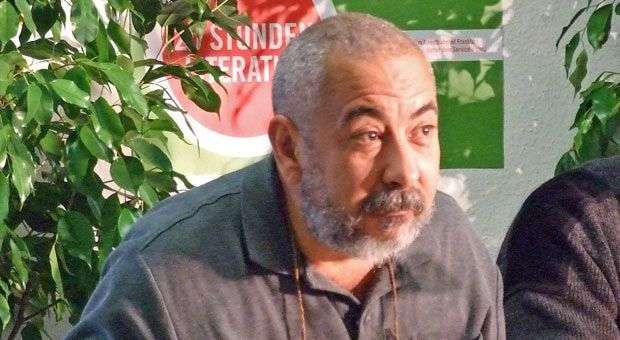The line seemed endless. As in all Cuban queues, there was the second part, the continuation: the next step. You waited for a good time to buy, and then had to have the same patience to get the signature. It was not compulsory, but who could purchase the book and not put it in front of the author for him to sign an autograph?
Leonardo Padura finished writing “The man who loved dogs” sometime in 2009. Four years later he continues to address the “consequences” of his latest creation, either before disciplined crowd in Vedado or in an interview with an Argentine journalist.
The interest of the press, the succession of awards and formality of signing his name with that rushed calligraphy of autographs, is the reaction to a book nature of much talk and that few have read in Cuba. Getting a copy is a stroke of luck, not because of its scarcity, but in the interest of the Cuban readers, depleting any issue in the minimum time needed from learning about it and coming and buying.
“The man who loved dogs” is a historical novel and its characters breathe in Havana of the seventies and eighties or Europe between wars, with eyes on the Moscow of Stalinist purges or lurking in the Spain of civil war.
Discovering that Liev Davidovich is not another one of those poor devils sent to get really cold in Siberia, is the first of many surprises that the reader is promised in a novel about a murder, and ends jumping from Kyrgyzstan to Baracoa (yes, Guantanamo), or from Barcelona to the fjords of Scandinavia.
The end of the story is known from the first page, which recalls the news of the death of Trotsky, a historical event so well known that it is not worth using it as a mystery for a novel. Padura beyond the cliché to amaze the reader with this fact entertains by telling what happened before the crime, a narrative interspersed with the life of a Cuban named Ivan, who, as the reader, is discovering who Leon Trotsky was.
A question arises while passing from one page to the following: to what extent are reading Padura’s imagination and how much of History (capitalized) is in these pages? How real was the Soviet Union that the author puts into the mouth of Lev Davidovich?
Personally, I think reliable portrait of the attitude of those Catalan communist militants, whose discipline and ideological stubbornness so impressed a British militant named Eric Arthur Blair, who later wrote a novel called 1984, under the nickname of George Orwell.
In his novel, Padura tells the story from three points of view: the mind of the most revolutionary opposition to Stalinism, the Republican soldier tormented by a subordinate to Moscow Jocasta and the usual Cuban character of his novels (another one of those disillusioned old contemporary of Mario Conde).
No missing, as usual, are the metaphors and irony-laden sentences and teasing superlative catharsis toward Cuba in the seventies, which Padura and other Cuban intellectuals seem to remember so well … and they feel so little appreciation for.
Leonardo Padura’s name on the cover of a book makes it an instant bestseller, but “The Man Who Loved Dogs” has a special appeal, perhaps, for the tens of thousands of Cuban professionals who lived and were trained in the Soviet Union, or for new generations yet are taught in schools of twentieth century history revolves around the October Revolution, the Great Patriotic War and the Cold War between socialism and capitalism, they see and hear memories of the Soviet republic with the same awe with which one can imagine a brontosaurus grazing, unshakable and majestic, sometime in the Jurassic.
Through nearly five hundred pages, until such time that Ramón Mercader kills Trotsky following Stalin’s orders, “The man who loved dogs,” I was hooked by Lev Davidovich revisionist arguments, for the stupid blindness of a manipulated Catalonian and the fate of one Ivan who chose to be terrible himself.










